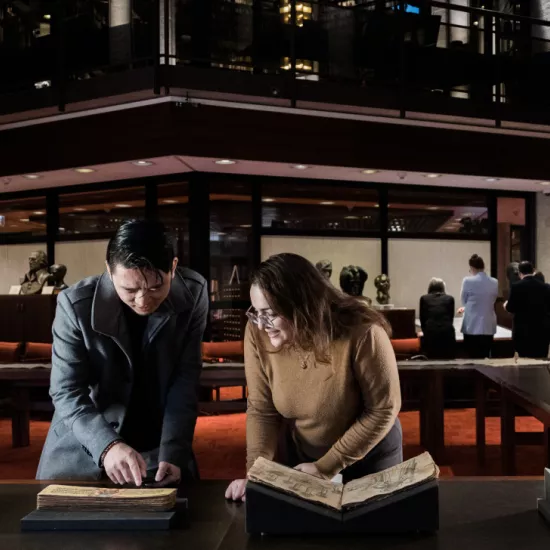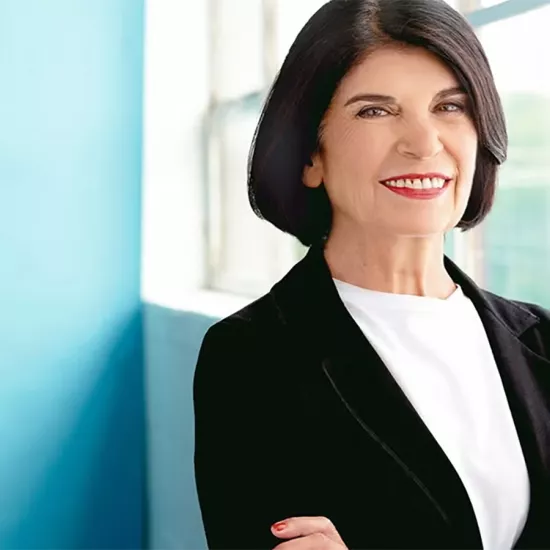Act now, say speakers at climate change summit on campus

“Our house is on fire,” said Dianne Saxe, PhD, Ontario’s former commissioner of the environment, speaking to a packed lecture hall at UTM during the Sept. 24 event, Meltdown: A Climate Change Summit. “We need to reduce our use of fossil fuels.”
The summit, organized by the Riverwood Conservancy, explored the impact of climate change on the world at large and Ontarians specifically, and homed in on the health impacts of the related rise in temperatures and severe weather events. Saxe delivered the keynote address, followed by two physicians from North York General Hospital, Drs. Joyce Lee and Jeremy Theal; Ben Brisbois, PhD, a researcher and adjunct professor at the University of Northern British Columbia; and Pegeen Walsh, executive director of the Ontario Public Health Association (OPHA).
The event was a key feature of Climate Week at UTM, one of the events bookended by two worldwide climate strikes organized by Fridays for Future, the climate action organization started by Greta Thunberg, the young Swedish climate activist. For the uninitiated, the need for climate action became clear as the speakers outlined the scientific evidence of climate change and the projections for the future unless citizens and governments take prompt action.
The data is clear, said Saxe, echoing Thunberg’s words to the United Nations: “The popular idea of cutting our emissions in half in 10 years only gives us a 50 per cent chance of staying below 1.5 degrees [Celsius], and the risk of setting off irreversible chain reactions beyond human control.... a 50 per cent risk is simply not acceptable to us — we who have to live with the consequences.”
- Canada is warming twice as fast as the global average
- Since 1948, Canada has warmed 1.7 degrees
- Climate extremes in Ontario are 4 times more likely than in the 1960s
- Ontario insurers paid $1.3 billion in 2018 due to climate-related weather events
Rather than consider our current weather and its effects the “new normal,” Saxe said there was nothing normal at all about what we are experiencing.
“The climate crisis is just starting to accelerate,” she said, urging the audience to act individually and collectively to bring about change. “We are in completely uncharted territory.
“Absolutely, go to the climate strike. It matters; it’s waking people up. We need feet on the street.”
Lee and Theal, both physicians, brought warnings, based on research, about the health effects of climate change resulting from fossil fuel pollution. They pointed out that fossil fuel air pollution kills more people worldwide annually than smoking: 8.7 million vs. 7.2 million. Surprisingly, more of these deaths are due to heart disease and stroke than to lung problems. As rainfall anomalies become more common in Canada, said Lee, the incidences of waterborne diseases such as cholera, hepatitis A, typhoid and E. coli will increase, despite the common belief that these are not “First World” illnesses.
“If we continue with business as usual,” she said, “North America will see a 400 per cent increase in extreme downpours by the end of the century, and there will be droughts, too.”
Drought, noted Theal, brings its own consequences. Food yields decrease and so does the nutritional content of the food.
“Forty per cent of the world’s population is affected by water scarcity,” he said, “and it is projected that by 2050 there will be between 143 million and 1.5 billion climate refugees.”
Brisbois, whose research looks at climate change and malaria in Kenya, told the audience that as we seek solutions for climate change, we must also be aware of the unexpected impact on vulnerable populations, especially in the Global South. Seemingly easy solutions may affect these people disproportionately; if we consider lithium a valuable alternative energy source, for example, we must be aware that mining it may result in the violent displacement of people whose land sits on resource-rich territory.
“Question solutions to climate change that keep existing structures in place,” Brisbois said. “Reinforcing the status quo is not best. It’s important to listen to various communities.”
Walsh, from the OPHA, ended the evening with an upbeat message: “Societal change is possible.”
There are important changes she has seen in her lifetime, Walsh said, that were a result of social action: tobacco control, increased accessibility and women’s rights.
Her organization has created a climate change and health campaign targeting parents of young children, since they tend to be involved in their communities. It urges parents to get involved in political action and offers guidance on how to do so.
Lee underscored the importance of getting involved.
“Climate apathy is just as bad as climate denial,” she said. “Only 3.5 per cent of the population needs to be behind an issue for the tide to turn.”
Mekenna Bowers, a fourth-year UTM student in comparative physiology, was one of the many university and high school students who attended the summit.
“I’ve gotten a lot out of it,” Bowers said. “I’ve been trying to be more aware of my own footprint, but it’s nice to see the impact on a larger scale.
“I also love to see such a good turnout and to see people with open minds who are willing to educate themselves.”



